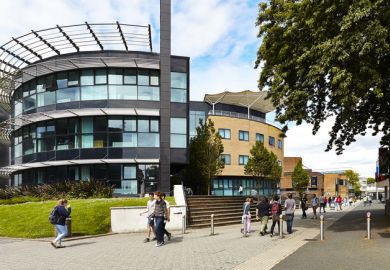Source: Alamy
The overhaul of admissions, in which applicants would be identified by a number rather than their name, would reduce “unconscious bias” against students from ethnic minorities by university admissions staff, according to a study by the race equality thinktank the Runnymede Trust, which was published on 3 February.
The recommendation is based on evidence that black and ethnic minority students are less likely to win a place at a top universities even when they have the same grades.
Once A-level grades are taken into account, 52 per cent of applications by white British students to Russell Group universities resulted in offers compared with only 44.7 per cent for black Caribbean students, 42.6 per cent for Bangladeshi students and 39.6 per cent for Pakistani students. For those from black African backgrounds, the offer rate was 39.6 per cent.
“Leaving people’s names off Ucas forms would be an experiment to see if people are being influenced by names,” said the report’s author Vikki Boliver, a senior lecturer in sociology at Durham University.
On the potential for unconscious bias by university staff, she added that “we all carry stereotypes in our heads”.
“If we don’t have very clear procedures when selecting people for jobs or places on courses that mitigate against those stereotypes, there may be the danger that we unconsciously fall back on them,” said Dr Boliver.
“We may feel that certain people will ‘fit in’ better,” she added.
The analysis is an update on work published in March 2013, which led Dr Boliver to conclude that admissions at Russell Group universities were “far from fair”.
Her findings were later disputed by Ucas, whose own analysis found that much of the difference in offer rates was caused by ethnic minorities applying to highly competitive courses, such as medicine or dentistry. However, it said that universities may want to investigate the “small differences” in offer-making.
On the latest report, Wendy Piatt, director general of the Russell Group, pointed out that “a crucial piece of the jigsaw” was missing because the research took no account of whether students had taken the right A levels for their intended degree course.
“Many good students haven’t taken the subjects needed for entry and universities need students not only to have good grades, but grades in the right subjects for the course they want to apply for,” she said.
“Real progress” had been made in improving the diversity of the student population at Russell Group universities, she added.
“The numbers of black students accepted by Russell Group universities went up 40 per cent between 2010 and 2014 and the number of Asian students by 13 per cent,” she said, adding “we are keen to see this trend continue further”.
A spokesman for Ucas said: “Data such as an applicant’s ethnic group, religion or sexual orientation is only released to HE providers after decisions or offers have been made. Admissions professionals do have access to applicant names and there is no evidence that this causes any bias in decision making.
“Ucas regularly makes available data to support research and understanding of higher education admissions. In accordance with good practice and the permissions given when people apply, this is suitably anonymised to prevent the personal details of applicants being disclosed.”
Register to continue
Why register?
- Registration is free and only takes a moment
- Once registered, you can read 3 articles a month
- Sign up for our newsletter
Subscribe
Or subscribe for unlimited access to:
- Unlimited access to news, views, insights & reviews
- Digital editions
- Digital access to THE’s university and college rankings analysis
Already registered or a current subscriber?




